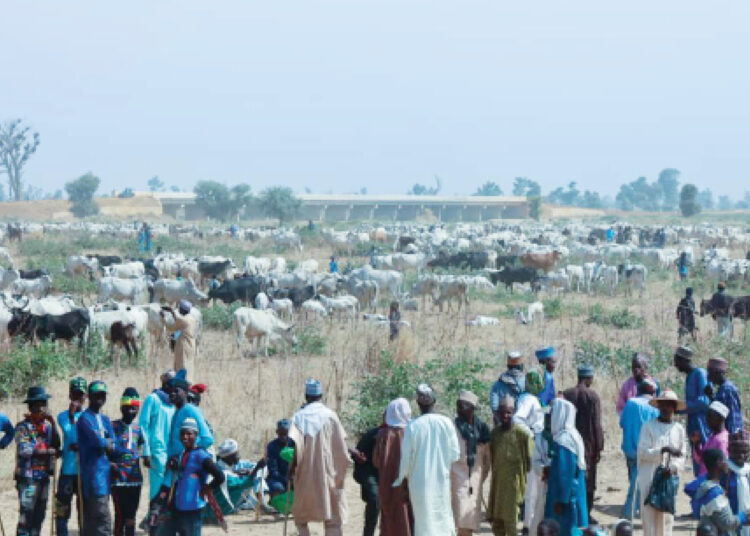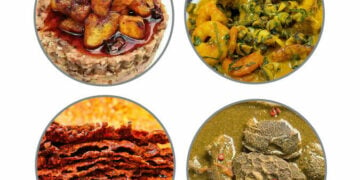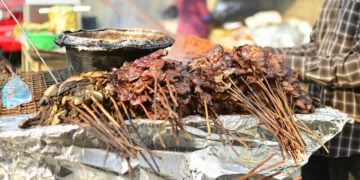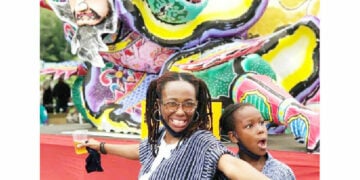Farouk Musa, 34, watches his herd of white cattle graze under the expansive sky in Bage, a community in Funakaye, Gombe state. As a digitally financially included herder, he exemplifies the possibilities of financial inclusion.
Musa, who manages over 100 cattle, joined a cooperative society three years ago that trained herders on financial inclusion. Today, he uses digital payment platforms to conduct cashless transactions with cattle dealers and veterinarians, as well as to purchase animal feed.
“I used to travel to the Bajoga cattle market to collect cash for the cows I sold,” Farouk recalls. “But now, with a bank account and a phone, I receive payments directly from dealers. It’s saved me time, resources, and improved security,” he added.
Musa explained that mobile banking has also helped him invest in his herd. “When the Central Bank’s (CBN) cashless policy was implemented about two years ago, I opened a bank account to keep my business going. It was difficult to find cash back then,” he said. “Now, I receive payments for my cattle electronically.”
The benefits of digital financial inclusion extend beyond convenience and security. For Musa, it has enhanced both his life and his business. However, he remains one of the few exceptions among herders.
Not all stories are the same, though. In a world where technology connects people instantly and enables digital payments, many Fulani herders remain excluded from digital financial services.
Adamu Sulaiman, a herder from Tilden-Fulani in Toro, Bauchi State, doesn’t understand the digital financial system or how it could impact his livelihood. He doesn’t have a bank account, and the nearest bank is about 65 miles away.
“I rely on cash,” he told LEADERSHIP Sunday , holding a worn wallet. “What use is money in the bank if it can’t feed my cows?” he asked, clearly frustrated.
Like Sulaiman, thousands of Fulani herders face obstacles to digital financial inclusion. Their challenges stem from nomadic lifestyles, limited financial literacy, and poor network coverage.
Aliyu Umar, another herder from Barkin-Ladi in Plateau State, expressed similar frustrations. “There are no banks in the bush, and no PoS agents where I live,” he said. “Even if I had a phone, how would I charge it or use it?
Umar believes education plays a role. Many herders, himself included, struggle with formal literacy. Reading text messages, deciphering figures or navigating mobile apps becomes an uphill task. “They tell us about these things in town. They don’t speak our language.
Government programmes have attempted to make a difference. Around two years ago, the Central Bank of Nigeria (CBN) launched the Cashless Policy to reduce the reliance on cash in the economy and promote a digital economy aimed at including millions of Nigerians in the financial system. Some banks have set up mobile money agents in remote areas, while Fintech companies offer solutions for rural inclusion. However, these efforts often fall short of addressing the specific needs of herders in the country.
Data released by EFInA in 2023 shows that 26 per cent of Nigerians are financially excluded. Also, in 2020 about 52,400,000 people in northern states inhabited by mostly farmers and herders were financially excluded due to poor financial literacy.
Another herder, Aisha Bello, admires Musa’s success and hopes for the same. “I’ve heard about people receiving money through their bank accounts and phones,” she said. “But no one has shown us how to do it. We need help to learn.”
Aisha pointed out that women herders face extra challenges. Cultural norms often restrict their access to training programs or technology. “We want to improve our lives too, but we lack the necessary financial literacy,” she told LEADERSHIP Sunday, her voice resolute.
For herders like Sulaiman, Umar, and Aisha, the issue isn’t just about technology—it’s about financial literacy, trust, and education. Currently, a significant digital financial divide persists among Fulani herders in Nigeria. However, the success of herders like Farouk Musa demonstrates that change is achievable with the right tools and support
Miyetti Allah Calls For Large-scale Awareness Campaign:
Bauchi State Chairman of Miyetti Allah Cattle Breeders Association of Nigeria (MACBAN), Kabiru Yusuf, explained that Fulani herdsmen face financial exclusion in Nigeria due to their nomadic lifestyle limiting access to formal financial institutions.
He said most Fulani herdsmen lack financial literacy, which hinders their ability to engage with modern banking systems or benefit from financial products like insurance, loans, or savings schemes.
“Additionally, we have organised financial literacy workshops to educate herdsmen on the importance of savings, investments, and accessing financial services,” he said.
Yusuf explained that through these efforts, we aim to integrate Fulani herdsmen into the financial system and enhance their economic opportunities.
A professor of accounting and finance at Abubakar Tafawa Balewa University (ATBU) Bauchi, Bala Dalhat stated that achieving financial inclusion for Fulani herders in Nigeria requires the use of mobile and agent banking.
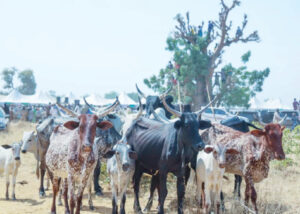
He explained that due to the nomadic lifestyle of herders and their presence in remote areas, traditional banking infrastructure is often out of reach.
This approach enables herders to conduct transactions, save money, and access credit or insurance via mobile phones and designated agents, eliminating the need to visit a bank branch,” he explained.
Professor Dalhat emphasised the need for customised financial products and literacy programs aimed at Fulani herders.
“Financial institutions should create products that meet the herders’ specific needs, such as microcredit for livestock management, weather-based insurance for livestock losses, and savings plans aligned with their seasonal income cycles.”
“Furthermore, targeted financial literacy programmes should be introduced to teach herders how to use these services effectively. These programmes should be offered in local languages and integrated into existing community structures to ensure better outreach and adoption,” he stated.
This report is part of the DPI Africa Journalism Fellowship Programme, a partnership between the Media Foundation for West Africa and Co-develop.

